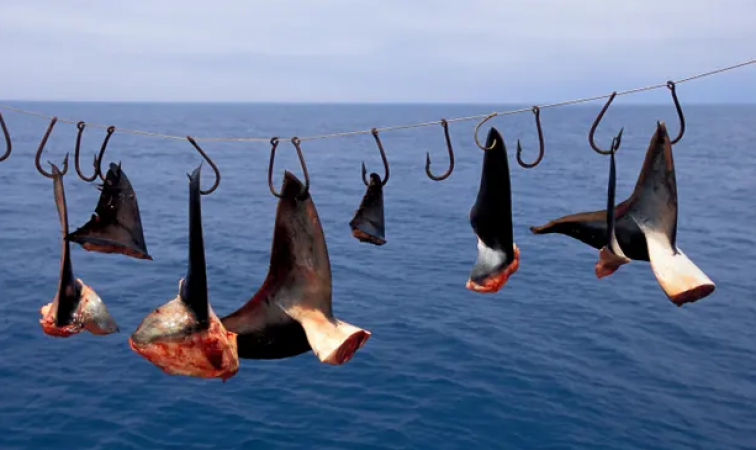
United States: This is one of the bloodiest haunts in the seafood business.
Every year 73 million sharks have their fins cut off their backs, and their bleeding bodies are sometimes thrown back into the water, where they are left to suffocate or die from blood loss. .
Although China, where shark fin soup is a status symbol for the rich and powerful, perpetuates barbaric practices, the American seafood industry is not free from trade.
Recent criminal indictments have brought to light how American companies are supplying a market for feathers that activists claim is as reprehensible as the now-illegal trade in elephant ivory once federal and state. was by exploiting a patchwork of laws.
A complaint was quietly filed in Miami federal court last month, accusing Elite Sky International, an exporter with offices in the Florida Keys, of mistaking nearly 2500 kilograms of shark fin as live Florida spine lobster for China. was labeled with.
Another company, South Florida-based IIFA Seafood, is also the subject of a criminal investigation for comparable violations, according to two people who spoke on condition of anonymity to discuss the ongoing investigation.
The company is run by a Chinese-American woman who in 2016 pleaded guilty to illegally transporting more than 500 pounds of live Florida lobster into her home country.
Law enforcement is now paying more attention as Congress considers a federal ban on shark fins, which would make it illegal to import or export fins, even if caught overseas. Thousands of shark fins are confiscated each year by U.S. wildlife inspectors while they are taken to Asia because shipments were not announced.
One of the most expensive seafood products by weight anywhere, a pound of shark fin can sell for hundreds of dollars, depending on the species.
Whitney Weber, campaign director for Oceana, a Washington-based organization that supports the ban, questioned: "If you're going out of business because you can't sell the fins, what are you really fishing for?
Federal law has prohibited the removal of shark fins and throwing their bodies back into the water since 2000. However, individual states have great discretion in deciding whether businesses can collect shark fins from dead animals at docks or import them from overseas.
An almost complete ban on trading Finns would be imposed by legislation that made its way through Congress, mirroring a decision made by Canada in 2019. The legislation has majority support in both the House and Senate and was introduced by a bipartisan in 2017. MPs group.
According to lobbying records, Elite is one of the groups opposing the proposed ban and has appointed lobbyists to urge Congress to reject the measure.
It is unknown how the Elite got its wings. But the business was also accused of buying lobster from Nicaragua and Belize after it was misrepresented as being caught in Florida in a criminal complaint.
The New York City-based organization affiliated with the Chinese-American seafood exporter was accused of breaching the Lacey Act, a century-old law that makes it illegal to submit fictitious paperwork for any wildlife exported overseas.
Elite's legal counsel and two IIFA representatives declined to comment.
Since the 1970s, overfishing has led to a 71% decline in shark species. According to the International Union for Conservation of Nature, a Swiss organization that monitors wildlife populations, more than a third of the world's 500+ shark species.
According to a recent Greenpeace report, titled "Hooked on Sharks", the US will export 3.2 million kilograms of shark meat (without fins), which is more than US$11 million in 2020, from Spain, China and Portugal. The latter is ranked fourth in the world.
According to Weber, instead of protecting a small shark fishing industry, America should lead the way in establishing protections for the long-lived, slow-growing fish.
According to Weber, if we are not cleaning up our own work, we cannot expect other countries to do the same.
In an industry where unscrupulous individuals lured by the prospect of huge profits is a persistent problem, he claimed that the existing laws are inadequate as a deterrent.
A campaign to stop shark fishing for commercial purposes could backfire, according to Damien Chapman, director of shark research at the Mote Marine Laboratory in Sarasota, Florida.
Chapman said, "Even if the US withdraws from fin trade entirely, there will be no immediate impact on global demand, and it is likely that other countries will be able to impose much less restrictions on their fisheries." will take steps."
He claimed that Democratic Senator from New Jersey, Cory Booker, who introduced the bill, was inspired by "shark fans"—not "shark fins"—and that people who want to see the fish species are given the same high level of protection. sea is a hub for the transportation of shark fins can be changed without punishing domestic fishermen.
Between perceptions and reality, there is a gap, according to Chapman. "Sharks have evolved from demon fish to a group of species that many people want to protect in the 25 years that I've been studying them. This is fantastic, but we must also support management strategies grounded in science that deal with the real issues.
First US test case Kansas votes to uphold abortion rights
China promises military operations near Taiwan In response of Nancy Pelosi's visit
Brittany Griner appears in a Russian court for US exchange offer